In the realm of international currency exchange, timing plays a pivotal role in maximizing the value of your transactions. The British pound sterling (GBP), as one of the world’s major currencies, experiences fluctuations influenced by various economic, political, and market factors. Understanding when to buy British pounds can significantly impact the cost-effectiveness of your currency exchange transactions. In this article, we delve into the intricacies of timing currency purchases to help you make informed decisions and optimize your exchange rate outcomes.
Factors Influencing GBP Exchange Rates:
Economic Indicators:
Economic indicators such as GDP growth, inflation rates, unemployment figures, and interest rates significantly influence currency valuations. A strong economy generally leads to a stronger currency. Monitoring economic reports and forecasts from reliable sources like the Bank of England (BoE) and reputable financial institutions can provide insights into the GBP’s future trajectory.
Political Stability:
Political stability and uncertainty can impact currency values. Events such as general elections, referendums, and geopolitical tensions can introduce volatility into currency markets. For instance, Brexit-related developments have historically influenced the GBP’s value, leading to fluctuations based on negotiations, announcements, and market sentiment regarding the UK’s future relationship with the European Union.
Market Sentiment:
Market sentiment, driven by investor confidence, risk appetite, and global economic trends, plays a crucial role in currency fluctuations. Positive sentiment towards the UK economy or geopolitical stability can strengthen the GBP, while negative sentiment may lead to depreciation. Monitoring market sentiment through financial news outlets and sentiment indicators can help gauge the direction of currency movements.
Best Times to Buy British Pounds:
Consider Economic Calendar Events:
Economic calendar events, including central bank meetings, monetary policy announcements, and key economic data releases, can significantly impact currency markets. For example, BoE interest rate decisions and inflation reports often lead to heightened market volatility. Planning your currency transactions around these events allows you to capitalize on potential fluctuations and secure favorable exchange rates.
Brexit-Related Developments:
Brexit negotiations and related developments continue to influence the GBP’s value. Major announcements, breakthroughs, or setbacks in negotiations can trigger significant currency movements. Keeping abreast of Brexit-related news and developments enables you to anticipate potential market reactions and time your currency purchases accordingly.
Currency Volatility Patterns:
Analyzing historical volatility patterns can provide insights into opportune times for currency exchanges. While past performance is not indicative of future results, identifying periods of heightened volatility in GBP exchange rates can help you capitalize on favorable rate movements. Tools such as volatility indices and historical exchange rate data can assist in identifying potential trading opportunities.
Time of Day and Week:
Currency markets exhibit varying levels of activity throughout the day and week. The London trading session, which overlaps with other major trading sessions, often experiences increased liquidity and volatility, making it an optimal time for currency transactions involving the GBP. Additionally, avoiding weekends and holidays when liquidity may be lower can help mitigate the risk of unfavorable exchange rate fluctuations.
Long-Term Trends:
For individuals or businesses with flexibility in their currency exchange timelines, monitoring long-term trends in GBP exchange rates can offer strategic advantages. Identifying overarching trends, such as gradual appreciation or depreciation over extended periods, can inform decisions regarding the timing of currency purchases to align with favorable long-term outlooks.
Mitigating Risks and Maximizing Opportunities:
Diversification and Hedging:
Diversifying currency exposure and utilizing hedging strategies can help mitigate risks associated with currency fluctuations. By spreading currency holdings across multiple currencies or utilizing financial instruments such as forward contracts and options, you can protect against adverse exchange rate movements while potentially benefiting from favorable fluctuations.
Consultation with Currency Experts:
Seeking guidance from currency experts, such as financial advisors, currency brokers, or economists, can provide valuable insights and recommendations tailored to your specific needs and objectives. These professionals can offer analysis, market intelligence, and personalized strategies to optimize your currency exchange outcomes.
See also Is the pound a risk currency?
Conclusion:
Timing plays a critical role in maximizing the value of currency exchange transactions involving the British pound sterling (GBP). By understanding the various factors influencing GBP exchange rates and employing strategic timing techniques, individuals and businesses can capitalize on favorable rate movements while mitigating risks associated with currency fluctuations. Whether leveraging economic indicators, monitoring geopolitical developments, or analyzing historical volatility patterns, informed decision-making and proactive planning are essential for achieving optimal exchange rate outcomes.


